- Home
- Robert Goddard
Hand in Glove Page 4
Hand in Glove Read online
Page 4
A woundingly large portion of Derek’s savings, then, to be forfeited in the event that Colin decided a moonlight flit to an extradition-haven was in order. Even as Derek considered the possibility, he caught himself reflecting at the same time that it might almost be worth losing such a sum if it meant Colin could never again ask him for help.
“Your brother indicated you were the only person likely to be willing to assist.”
“No doubt.”
“And are you…willing to assist?”
“Yes. I suppose I am.”
“Can you attend the court tomorrow morning?”
Derek glanced at the diary that stood open on his desk. Wednesday the twenty-fourth of June contained nothing that could not be rearranged. “Yes. I can be there.”
“The magistrates’ court is in Bohemia Road, Hastings. Proceedings commence at ten thirty.”
“Very well. I’ll meet you there.”
Derek put the telephone down, lifted off his glasses and began rubbing the bridge of his nose. When he closed his eyes, the present—his sombre suit, his desk, his office, his glazed vista of Calverley Park, his every proof and appanage of age and status—floated away like gossamer in the breeze. In their place, he and Colin were children again in Bromley, Colin six years the older, as fly and daring as Derek was shy and timid. Derek had often in those days taken the blame for his brother’s antics and covered his tracks and falsified his alibis. And now he knew—if he had ever doubted it—that nothing had really changed.
He rose and crossed to the window. Tunbridge Wells was looking its best in the quiet midsummer weather, the pale façades of Regency villas dotted amidst the greenery, the hazy air seeming to weigh down still further the heavy-leafed horse chestnuts in the park. He had lived here for seven years now, seven good if scarcely glorious years of steady progress at Fithyan & Co. Barring catastrophes, a partnership lay within his grasp. But might not Fithyan consider his connection with a corrupt antique dealer—or worse still a murderer—just such a catastrophe? What would the clients say? What would the other partners think?
How he wished Colin had never settled in Tunbridge Wells. It had only been intended as a temporary move in the first place, a way of easing him back into the outside world. Instead he had found the Treasure Trove and a swift road back to the profession that had already undone him. And now, it seemed, it had undone him again, with a vengeance that might be visited upon his brother as well as himself.
Maurice had set off early for Rye and was to return to Bourne End direct. For the first time since Beatrix’s death, Charlotte was left to her own thoughts and devices. A morning of energetic gardening having failed to cure her restless mood, she went out in the afternoon, scouring the shops for half a dozen things she did not need.
As the working day drew towards a close, she found herself halfway down the High Street and realized with faint surprise that she was heading in the direction of Chapel Place. She could easily have turned aside and taken a more direct route back to her home in Mount Ephraim. But she did not. Curiosity—or something more complex—overcame squeamishness and she pressed on towards what she now knew was her destination: the Treasure Trove.
It was a narrow-fronted emporium with peeling paint around the windows, squeezed between a photographic studio and a second-hand bookshop. The Gothic script in which the name had been rendered over the door matched the style on the card Hyslop had shown her. To one side there was a separate doorway with a bell labelled simply FLAT. The interior of the shop was unlit and seemed cavernously dark by contrast with the brightness outside. There was no sign proclaiming opening hours and Charlotte, who had assumed that somebody would be standing in for the proprietor, felt slightly cheated.
Stepping closer, she shaded her eyes and peered through the window. Several bookcases and sideboards revealed themselves amidst the gloom. She glimpsed some shadowy oil paintings and dangling brasswork, a pine chest and a cheval-glass towards the rear. Then, stacked in a tall corner cabinet, she noticed the Tunbridge Ware. Small pieces for the most part, Fairfax’s legitimate collection—if it was legitimate—looked thoroughly unremarkable. Perhaps, thought Charlotte, that explained—
Suddenly, there was a movement close behind her, reflected in the cheval-glass. Glancing across to it, she saw a man standing almost at her shoulder, staring into the shop. He was of medium height, lean with thinning hair, dressed in a brown somewhat rumpled suit and wearing gold-framed spectacles on which the sunlight flashed. She would have taken him for a disappointed customer but for the intensity of his expression. There was in his face a look almost of agony. He did not shift his ground as she watched, merely gazed past her, apparently struck motionless by something he had seen or thought.
Charlotte turned and smiled at him. “I’m afraid it’s closed,” she said.
At first he did not respond. Then, as if her words had only just reached him, he looked at her and opened his mouth, but did not speak.
“It’s closed,” she repeated.
Still he said nothing. Then, abruptly, he swung on his heel and started back towards the High Street, walking with unnecessary speed, almost, it seemed to Charlotte, as if he wanted to run.
Derek reached the George & Dragon a few minutes after opening time. He was known as an occasional if scarcely regular customer, but was too distracted to do more than smile stiffly in response to the barmaid’s welcome. Taking his beer into the garden, he sat at a table and took several quaffs of it. He did not drink much as a rule, but he had every intention of breaking that rule tonight.
The first thing he must do, he told himself, was to stop behaving like the criminal his brother might not even be. Thanks to Colin’s use of the name Fairfax-Vane, nobody was likely to realize Derek was related to the proprietor of the Treasure Trove. In court, of course, and in newspaper reports of the case, they would insist on using Colin’s real name, but until then he was completely safe. The idea that the junior staff of Fithyan & Co. were already conducting a whispering campaign against him was therefore absurd. Though the idea that they might yet, he supposed, was not.
He swallowed some more beer, shaking his head at the thought of what the young woman outside the Treasure Trove was likely to have made of his conduct. He should never have gone there and did not really know why he had. She had only been trying to be helpful, after all.
Silently, he cursed Colin. What a strange thing brotherhood was. They had nothing in common save an ever more distant past. They did not even like each other. And yet they were bound together by something stronger than either love or friendship, something irresistible and indissoluble. Derek did not understand it, but he knew he could not overcome it. Tomorrow, reluctantly and with an ill grace, he would stand by his brother.
CHAPTER
SIX
Maurice had telephoned Charlotte upon his arrival home to report what he had learned from Chief Inspector Hyslop: that Colin Fairfax had been charged and would appear before Hastings magistrates in the morning. The appearance would be a brief one, with the case adjourned until a later date. All that was likely to be settled was whether Fairfax would be remanded in custody—as Hyslop hoped—or granted bail. Accordingly, Maurice had decided not to attend, feeling that two days away from Ladram Avionics were quite enough.
Charlotte, however, had taken a different view. She wanted to see the man who was responsible for Beatrix’s death. Doing so might satisfy her curiosity where peering into the window of the Treasure Trove had not. And so the morning found her at Hastings Magistrates’ Court, joining the throng of worried clients and harassed lawyers in its cheerless outer hall.
There was no sign of Hyslop and, with ten-thirty drawing near, she decided to enter the court. It was a small, modern, airless room of laminated wood and plastic-coated metal in which little of the law’s gravitas seemed detectable. There were several officials already present and, near the front, two men urgently engaged in a whispered discussion. One of them was a short rotund fellow in a dark
three-piece suit, a sheen of sweat visible on his high domed forehead. The other was taller and leaner, with his back turned so that Charlotte could not see his face. She thought they might both be solicitors.
“The Crown Prosecutor’s solicitor has just told me he’ll be opposing bail in the strongest possible terms, Mr Fairfax,” said Albion Dredge.
“So,” Derek replied, “I’ve wasted my time by coming, have I?”
“Not at all. Not at all. There’s always a chance.”
“How good a chance?”
“In view of the gravity of the charges—and your brother’s previous conviction—not very.”
Derek sighed. He had no wish to see Colin behind bars, but at least it would relieve his anxiety over whatever bail he might have to put up. “How long before the case comes to trial?”
“Six months or so.”
“Six months?”
“At least. The courts are inundated these days. Of course, there’s some possibility the Crown Prosecution Service may drop the aiding and abetting charge. They know it’s much the weakest of the three. It’s also the most serious. As it’s intended to be.”
“What do you mean?”
Dredge lowered his voice still further. “Between you and me, Mr Fairfax, I think the police added it to the list to put pressure on your brother. If he’d say who sold him the Tunbridge Ware, they might well drop it. And that might alter the situation over bail.”
“But Colin denies buying the stuff.”
“Exactly.”
“You mean he’d have to plead guilty to the other charges?”
“To handling, at all events.”
“Which he isn’t prepared to do?”
“Not yet, no.”
“I see. OK, Mr Dredge. Thanks very much for putting me in the picture.” Derek stood upright and turned to resume his seat in the row behind. As he did so, his eyes met those of a woman sitting another three rows back who had not been there before. Instantly, he coloured and looked away. It was the woman he had encountered outside the Treasure Trove the previous afternoon. And this time he could not walk away.
Who was he? Why was he here? Charlotte had scarcely begun to ponder the questions when a general hubbub signalled the start of proceedings. The desks at the front of the court filled rapidly. Hyslop nodded to her in acknowledgement as he joined the latecomers. Then a clerk bade them all rise and three magistrates took their places on the bench.
With less ceremony than Charlotte had expected, the case was called. A policeman led the defendant in through a side-door and escorted him to the dock. He stood with his hands resting on the rail before him, no more than twenty feet from Charlotte. Since his attention was focused on the bench, she had no need to worry that her scrutiny of him would be noticed.
He was tall and broadly built, with a flushed and rather puffy face, brown hair worn too long, greying at the sides and thinning on top. He wore a dark blue blazer, fawn trousers and an open-necked striped shirt that was stretched taut over a substantial paunch. There was a red handkerchief spilling flamboyantly from the breast pocket of his blazer and an oversized signet-ring on the little finger of his left hand. She had not expected to like him. On the contrary, she had expected to be repelled by him. And so, in a sense, she was. A ladies’ man going to seed, a smooth-talking fraudster running out of time and luck, grown old and careless enough to have set this squalid crime in motion. That is what she thought of him. And somewhere, on a level of which she was only partially aware, she wished he was younger and more blatantly charming. She wished there was more in him to detest.
Suddenly, she realized she had failed to keep pace with the business of the court. The charges had been read and the defendant had stated his full name—Colin Neville Fairfax. But he had not been asked to plead guilty or not guilty and this rather confused Charlotte. As did the speed with which the magistrates seemed to be moving towards an adjournment. “We will fix a full hearing for a month’s time,” announced the chairman. “Any objections?” None appeared to be forthcoming. The chairman craned forward to consult his clerk. “Is Friday the twenty-fourth of July acceptable to all parties?” Various heads nodded. “Very well. The twenty-fourth of July it is. Mr Dredge, you are appearing for the defendant?”
“Yes, sir.” As Fairfax’s solicitor bobbed up, Charlotte recognized him as the person to whom the mystery man from the Treasure Trove had been talking earlier. “My client will be disputing all the charges and therefore wishes to apply for bail.”
“Mr Metcalfe?” The chairman raised his eyebrows at the Crown’s solicitor.
“We oppose bail, sir. These are very serious charges. The police believe there is a strong likelihood that the defendant will not present himself for trial. In this regard, I should draw your attention to his previous conviction, details of which I have placed before you.”
“Ah, yes.” The chairman looked down at some papers in front of him. “Mr Dredge?”
“I would point out that my client was granted bail prior to that conviction, sir, and complied fully with the conditions imposed.”
“Quite so.” The chairman scratched his nose, then said: “Are you thinking of bail on the defendant’s own recognisance, Mr Dredge?”
“No, sir. The defendant’s brother, Mr Derek Fairfax, is prepared to stand as a surety.”
“And is Mr Derek Fairfax present?”
“He is, sir.” Dredge turned and extended his hand towards a figure in the row behind him, who half rose in response. And so at last Charlotte discovered who he was: Colin Fairfax’s brother.
“I see,” said the chairman. “Well now, I think we will retire for a moment.” At that he and his two colleagues rose and left.
Murmured conversations sprang up in their absence. Dredge moved across to the dock and began a whispered exchange with his client. Derek Fairfax did not join them, but looked in their direction and once, as Charlotte watched him, seemed about to glance towards her. But he did not.
Then the magistrates returned. After a general shuffling in seats and clearing of throats, the chairman said: “In view of the nature and gravity of the offences involved in this case, we have decided to refuse bail.” He looked across at the defendant. “You are remanded in custody, Mr Fairfax, and will reappear before us on the twenty-fourth of July. This case is now adjourned until that date.”
Derek was looking at Colin when the chairman announced he would not be granted bail and knew precisely what his crumpled wince of disappointment signified. It was the expression with which he had greeted life’s reverses from childhood, a weary acceptance that, through no fault of his own, his plans had gone awry. What followed was also characteristic. He raised his eyebrows, puffed out his cheeks and slowly shook his head. Then the policeman who had brought him in touched his elbow and he descended from the dock. At the last moment, before turning towards the side-door, he looked across at Derek and winked. In response, Derek could do no more than feebly raise one hand.
After Colin had vanished, Derek remained where he was, waiting for the court to empty. Dredge lingered for a moment, talking to his opposite number. When they had finished, he motioned for Derek to join him. Then, together, they moved slowly towards the exit.
“As I feared, Mr Fairfax, your brother’s previous conviction told against him.”
“You did your best, Mr Dredge. Where will Colin be held?”
“Lewes Prison.”
“Will I be able to visit him?”
“Of course. But I should leave it a couple of days. Let him settle in.”
Abstinence of all kinds would be his greatest hardship, Derek suspected. Alcohol, food, conversation and women. Despite Colin’s reputation as a Don Juan, that was probably the correct order. Last time, it had to be said, he had emerged looking fitter and healthier than when he had gone in. But he was older now, less resilient, less tolerant of discomfort, less than the man he had once been. “Do I take it from what you were saying earlier, Mr Dredge, that you’ll be encouraging
him to plead guilty, at least to the handling charge?”
“I’ll be explaining the consequences of not doing so, certainly.”
“And they are?”
“Potentially serious. The Crown can show he knew where the Tunbridge Ware came from. Therefore they can show he must have known it was stolen. Complicity with the thief is contestable. Knowledge that he was a thief isn’t.”
“So Colin has no defence?”
“Only his contention that the goods were planted, which no jury will swallow. And judges tend to reward what they see as perverse or mischievous pleas with heavy sentences.”
“What sort of sentence could we be talking about?”
“The maximum for handling stolen goods is fourteen years.”
Fourteen years would take Colin past sixty and the world into a new millennium. It suddenly seemed to Derek an unimaginably long time. “What about the other charges?” he murmured.
“Conspiracy to burgle carries the same maximum.”
“And aiding and abetting murder?”
“Is unlikely to stick.”
“But if it does?”
“Then the same as for murder itself. Life.”
After a brief conversation with Hyslop on the steps of the court building, Charlotte made her way back to her car, wondering why she felt so disappointed by what she had witnessed, why she could not summon up more indignation on Beatrix’s behalf. Colin Fairfax was not, of course, the man who had actually bludgeoned her to death, but he was responsible for it having happened. That seemed certain. Why then could Charlotte not hate him as she should?
She reached her car, climbed in and wound down the window. Birds were singing in the bushes behind her and somewhere music was playing on a radio. Beatrix would have forgiven Fairfax, of course. That was the irony of it. “Clearly the man meant me no harm,” Charlotte could imagine her saying. “If I had realized how badly he wanted the Tunbridge Ware, I would have given it to him.”

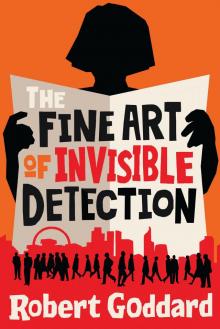 The Fine Art of Invisible Detection
The Fine Art of Invisible Detection One False Move
One False Move Panic Room
Panic Room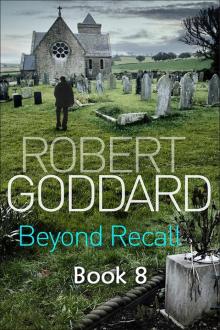 Beyond Recall
Beyond Recall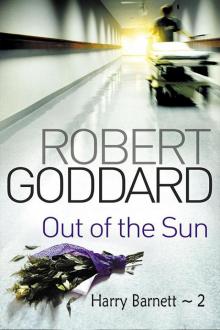 Out of the Sun
Out of the Sun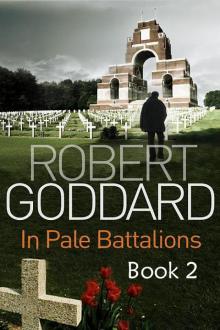 In Pale Battalions - Retail
In Pale Battalions - Retail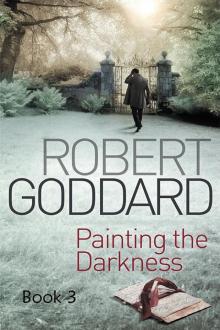 Painting The Darkness - Retail
Painting The Darkness - Retail The Corners of the Globe
The Corners of the Globe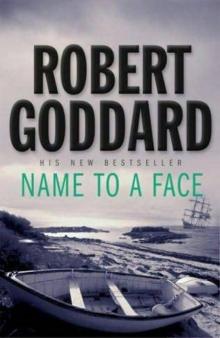 Name To a Face
Name To a Face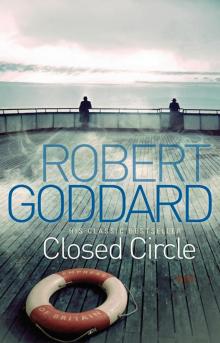 Closed Circle
Closed Circle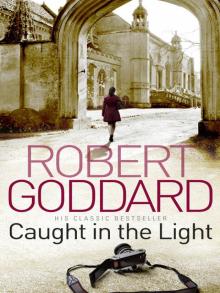 Caught In the Light
Caught In the Light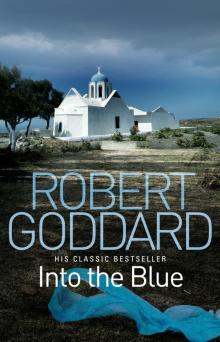 Into the Blue
Into the Blue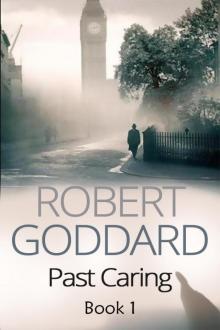 Past Caring - Retail
Past Caring - Retail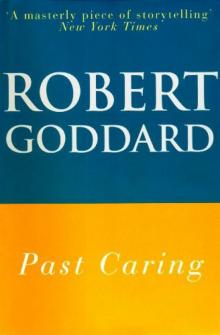 Past Caring
Past Caring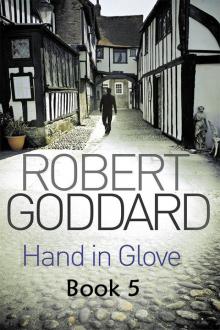 Hand In Glove - Retail
Hand In Glove - Retail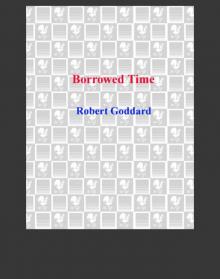 Borrowed Time
Borrowed Time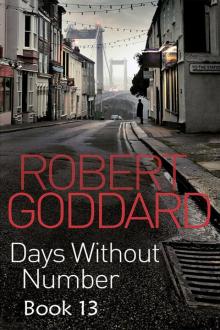 Days Without Number
Days Without Number James Maxted 03 The Ends of the Earth
James Maxted 03 The Ends of the Earth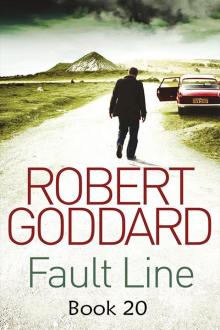 Fault Line - Retail
Fault Line - Retail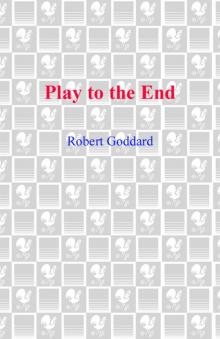 Play to the End
Play to the End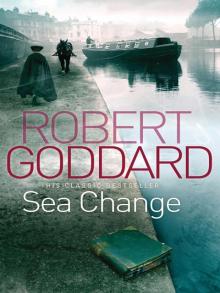 Sea Change
Sea Change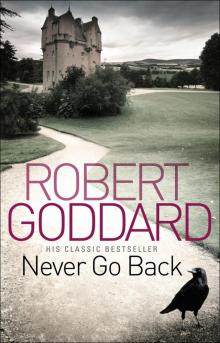 Never Go Back
Never Go Back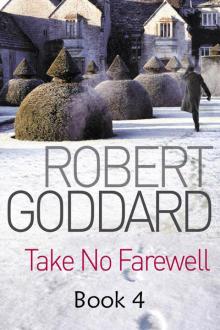 Take No Farewell - Retail
Take No Farewell - Retail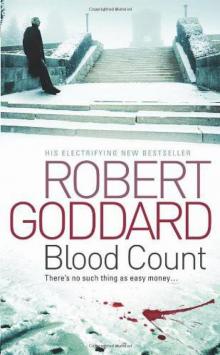 Blood Count
Blood Count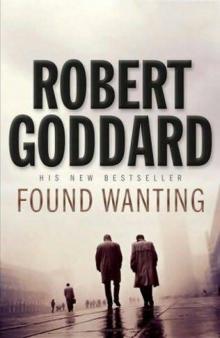 Found Wanting
Found Wanting Sight Unseen
Sight Unseen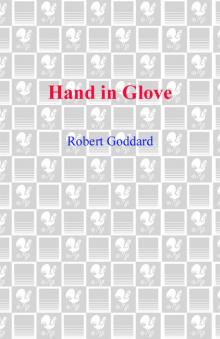 Hand in Glove
Hand in Glove The Ways of the World
The Ways of the World